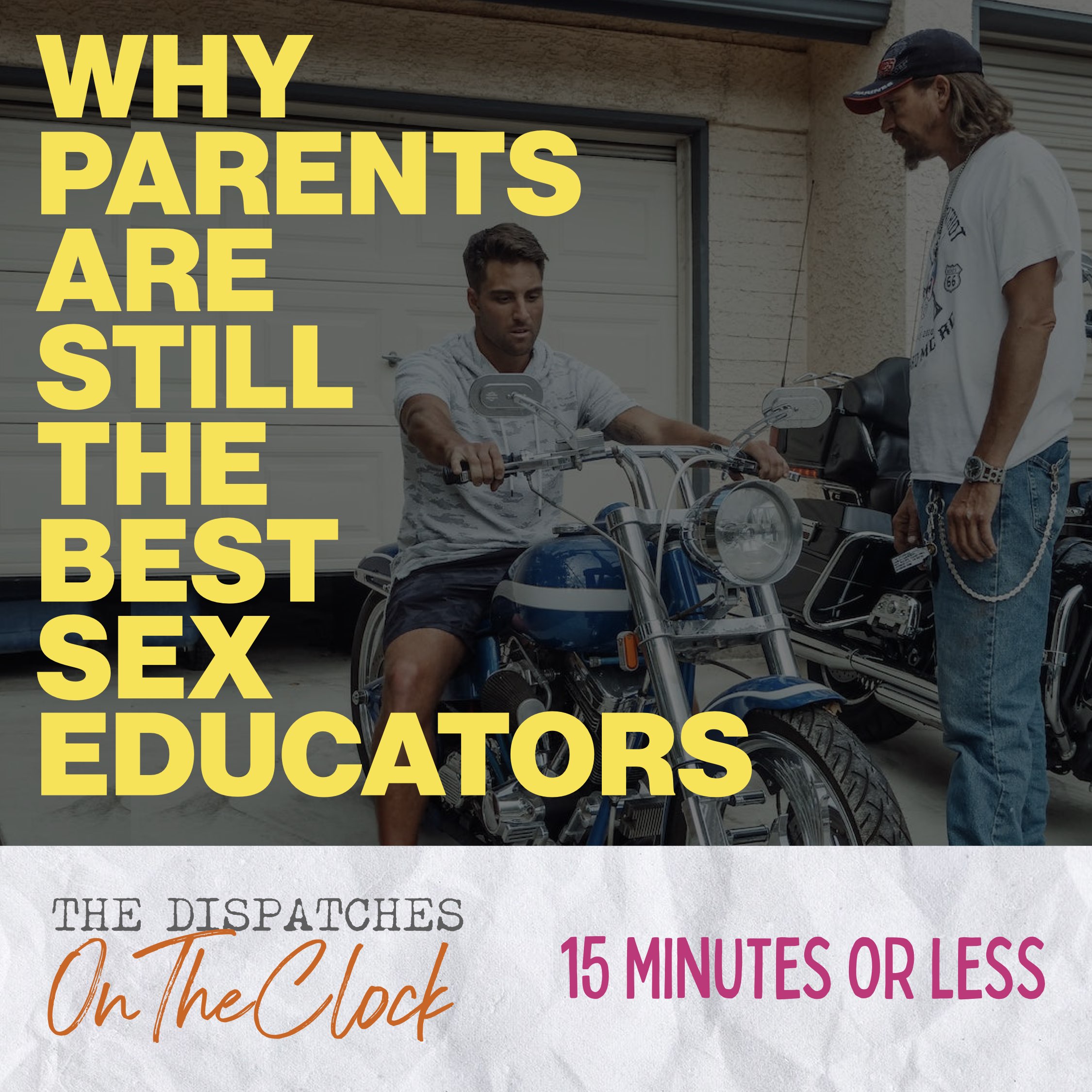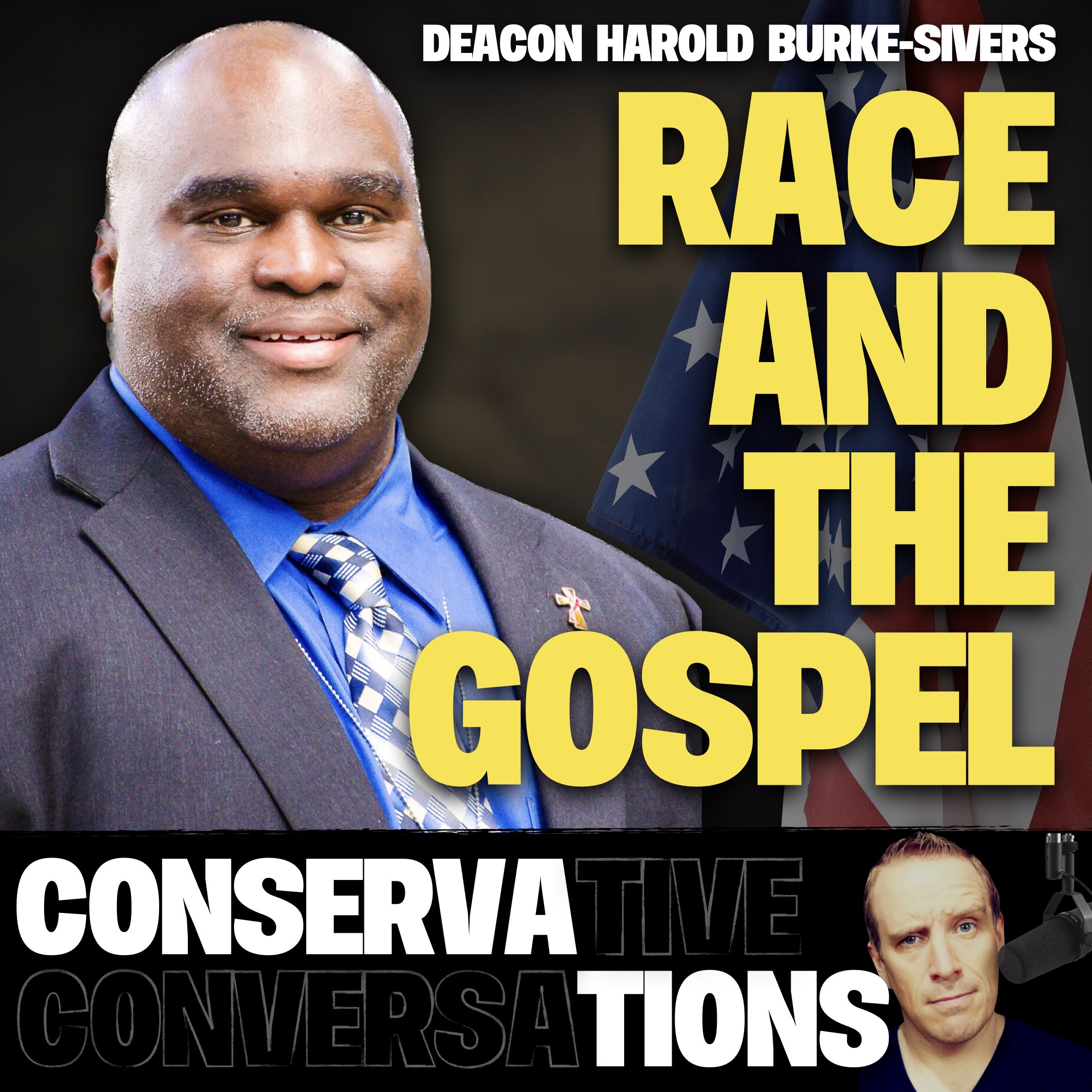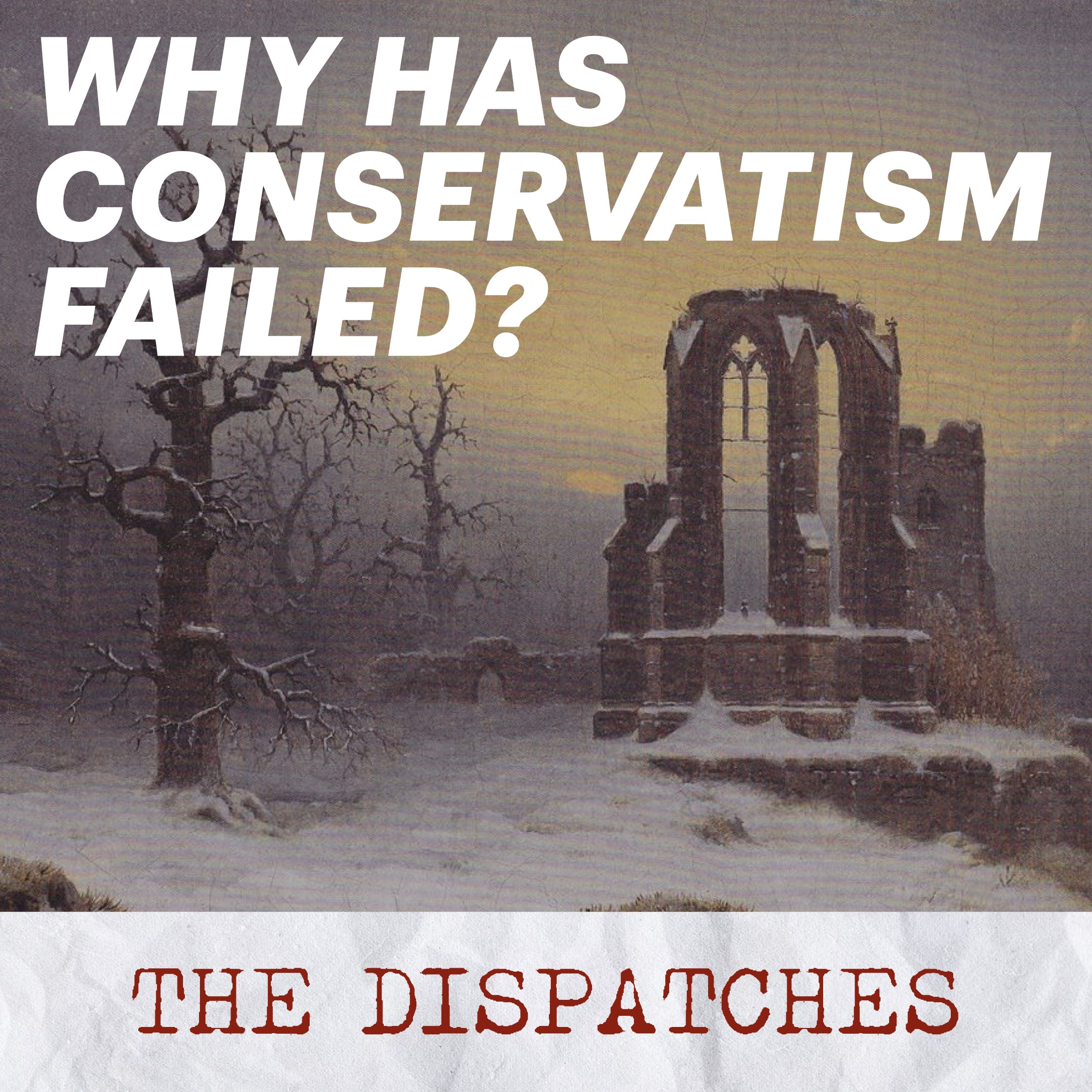[00:00:00] Ladies and gentlemen, start your stopwatches because you're listening to the dispatchers on the clock and that means we're gonna spend the next 15 minutes or less, okay? So this is gonna be another one of those episodes where we blow out that 15 minutes time budget and that's because we're actually gonna spend about 23 minutes talking about sex education.
[00:00:31] Okay? So the reason we're having this conversation today is because about a week or so ago there was a public meeting in Alexandra with Christopher Luxon and Nicola Willis, the leader and deputy leader of the National Party. And a question was asked about the current state of sex education in schools and basically how things now are really getting out of control in that area. And here's what Nicola Willis said in response. Here's how I feel about sexual education. That's the job for me and my husband to do with our kids based on our values and our views of the world. I want my education system focused on teaching my children how to read, how to write and how to do maths. That is a great response, a very common sense response. First of all, before we even get into what those who reacted to this had to say, I will say this. I think that her point about the need to refocus and very urgently refocus our schools on the essential priorities of education is absolutely 100% spot on. I think it's more than just a refocusing. I think there is a reform that is actually needed of our education sector. It feels to me like it is too ideologically and bureaucratically corrupted. And what needs to happen is there needs to be a return to the fundamentals of what education is supposed to be about. The good of knowledge, the good of human dignity and the sort of dignified ways of transmitting essential knowledge and not overstepping the boundaries and not turning our schools into little ideological factories or to political projects or places where effectively, they are doing everything that they shouldn't be doing that should be happening in the home. And not much of the stuff or not particularly well, the stuff that they actually should be focusing on. So I think that's a great point, first of all. Secondly, what happened after this rather unsurprisingly, was on social media. The social media scolds, particularly from the progressive fringes. They went wild when they heard and saw and read about her comments and there was this massive outcry from a very small but vocal minority who were like, this is outrageous. Parents are not actually qualified for this. The most qualified people to do this are sex educators and this is some sort of conservative fundamentalism come to New Zealand and all the usual stuff, the vitriol, the bigotry, often not even particularly veiled anti religious bigotry and all the rest of it that sort of comes out at moments like this. This is a reflection and in particular this reaction that talks about the idea that in actual fact there could be someone more qualified than a parent to actually have these conversations with their own children. This is a reflection of one of the great ideological problems of our age and that's the issue of technocracy. So this is about more than just your personal preferences, your personal moral preferences, your personal preferences for how to have conversations with your kids about sexuality. It's about more than that. It's actually about the very nature of what parents bring to those conversations and the role of parents and what we see reflected in our culture today with this attitude that the problem of technocracy is this idea that technical experts should be deferred to. And what we've got here is people who are suggesting that technical experts in sexual acts are somehow more qualified than parents to actually have these kinds of conversations around sexuality and the human person and relationships, et cetera, with their own children. I would argue that is completely untrue. Now parents aren't going to know necessarily everything and there are certain modern technical problems that arise as a result of say, for example, internet porn or the sexting phenomenon and things like that. And so they as parents might need specialists to help give them some good insights and practical tips. But that still doesn't mean that those experts are more qualified or more suitable to be having the actual conversation with their own children about these particular issues. And I say first of all, this from someone who's had almost 20 years now speaking in public to groups to youth events and in schools about the issue of human sexuality and sexuality related topics. And one of the things that I've noticed is over that period is that the supposed technical expertise or the level of education that young people are getting about the technical aspects of human sexuality, I think it's actually quite questionable. One of the first big warning signs I had of this was about 17 years ago. I was involved in a televised debate type situation. It was a mock debate with the film and television school, but there was a real audience and there was cameras and all the rest of it. And there was an actual panel that was brought in, and I was on one side with another person, and then there were two other people on the other side. And there was this question that was being debated, and the question was all around the effectiveness of encouraging young people to save the gift of sexuality for marriage. So teaching them what is sometimes called abstinence only education. That's a very reductionist way of naming and thinking about it. But that was the sort of the debate that was going on. And I had this lady on the other side of the panel who was working for the Family Planning Association as a sexuality educator in schools. She was someone who I think probably was in her maybe mid forty s at that stage. And she tried to argue with me that I was wrong when I pointed out that human papillomavirus could still be transmitted and contracted even if you wore a condom and the condom didn't break. And that's because human papillomavirus, the most common of the sexually transmitted infections, can be carried anywhere in the region from sort of your upper thighs to your lower abdomen and you can transmit it with skin to skin or skin to sore contact. And what that means is that the condom is incapable of actually covering that entire area of your body. So in that situation, the condom wouldn't actually do anything to stop skin to skin transmission of this particular virus, which is the leading cause of cervical cancer in women, and it has now been associated with other reproductive cancers in men as well. Now, the point of all of this I was trying to make was that there is something deficient and wrong with giving young people this simplistic message that effectively leads them to sort of glamorize condom use as this sort of foolproof and absolutely robust levels of protection. And there's a problem there because they're not getting the full facts about this. Now, I couldn't believe that this educator was trying to argue and claim that I was wrong about just this fundamental reality, this fundamental truth about this disease and how it can be transmitted. And she argued, she got quite strenuous actually, until the public health nurse on the panel just turned around and said to her, no, you're wrong. He's right. That's absolutely the case. And at that point she sort of quietly and rather awkwardly just moved on to another topic. And by the way, on that particular point, speaking about the quality of the education and the information that has been given at a technical level to young people over the years of the modern sexual education experiment, a few years after that interaction, the vaccine Gardasil was invented and released onto the market. And Gardasil, as you're probably aware, is a vaccine that protects against HPV, and in particular the strands of HPV, which cause almost all of the cervical cancer in women. Now, as soon as a vaccine for HPV came available, all of a sudden there was a very noticeable shift in what organizations like the Family Planning Association were actually telling young people about condoms and HPV. Now that they had a vaccine technology at their disposal, they now suddenly started telling people in their materials that you could actually catch HPV even if you used a condom. So all of a sudden they started telling young people something that they hadn't been telling them previously when the vaccine wasn't available. There has been a history of, I would argue, deficient and as a result, a lack of informed consent on the part of young people, a lack of understanding in some really fundamental areas about the technicalities of sex and contraception and everything else. Every group that I talk to about sexuality, I ask them the same question as part of the conversation and presentation, and that is, what do they think the failure rate for condoms is? And the failure rate for condoms is somewhere between eleven and 18%, depending on which study you actually look at. And there are even some studies that show us it could be as high as around 45% for adolescent users. That's kind of not surprising because a condom is a technical device, and younger brains in the heat of the moment and all that kind of stuff. But the point is, the studies sort of indicate it's around eleven to 18%. Now, first thing straight off the bat is it doesn't matter what the group is that I'm talking to, whether it's a state school or a religious school, whether they've had some sort of sexuality education or not. I have not had very many people. In fact, I could count the number of young people on one or two fingers over that entire almost 20 years now that I've been doing this, who could actually tell me the correct answer to that question? Most of them give a woefully overstated belief about the level of protection. They actually overstate it. They think it's greater than what it actually is. Secondly, and this is actually even more important than the actual understanding of what the true failure rate is for condoms is when I ask them, well, what do you think that actually means? So when I say to you the failure rate is between eleven and 18%, what does that mean in real practical terms? And I have had zero young people over the years, and as I said, this is almost 20 years now who are able to articulate accurately what that actually means. They just don't know. What they don't know is that that means that when they track couples who use particular contraceptive devices, they track them for a one year period. You follow 100 couples, it's something that used to be known as the Pearl pregnancy index. You track 100 couples for one year who are using condoms, and the number of couples who have a contraceptive failure leading to pregnancy. That's how you get that number. So what that means is eleven to 18 out of every 100 people using condoms will get pregnant each year. Now, that's a whole different level of risk than what most young people would think. They tend to think of it like a video game character who has a shield or a life meter, and they think, well, if I've got 88% of my life meter left, I'm in a pretty good position, right? But that's not what that actually means. It's a lot more risky than that. The other thing to note about those studies is they are not studying for contraceptive failures that lead to the transmission of sexually transmitted infections. They're only tracking pregnancies and pregnancies. The window for pregnancy. It's about a one in five chance each month that you could get pregnant. There's a small window where a female is fertile each month. And so the ability to get pregnant is not 24/7, but the ability to actually transmit, to contract a sexually transmitted infection is 24/7. So that has some pretty big implications for failure rates when it comes to sexually transmitted infections. Young people don't really consider that in the equation either. And not just that, but there is also research. We've known for a few decades now that the failure rate, for example, of condoms seems to be cumulative. So if you follow those 100 couples over a ten year period, some studies have even indicated it could be as high as a 50% failure rate. So one and two. So all of this matters, right? Because if someone who's 15 decides to become sexually active, they don't stop when they're 16, they're likely to go for another 10, 20, 30 years. So all of this is part of the equation and that's not even covering other issues like relationship, future relationship successes, future relationship happiness, the issue of being treated with authentic love and what it means not to have that. The complications of sexual entanglement and involvement with another person when you come to break up the ability of young people to navigate these things safely, what this might mean in your future relationships when you have a whole lot of baggage and memories that go with you. All of that kind of stuff. There's all of that that's not even really considered at all in any meaningful way. But just on the technical aspects, there are some big flaws here. The sexual education experiment has got some big problems here's the thing. What I'm seeing now more and more is that so called sex educators in schools are actually more likely to be ideological instructors than they are people who are well educated in sexual health and technical knowledge about contraceptives and diseases. They can give you a few basic facts, but they're not like, say, for example, a doctor who has more medical expertise in these things and we are treating them and we are deferring far too lofty of you onto these people. We are thinking that they're far more qualified than they actually are. Basically what's going on here though, is you've got this oil and water dichotomy and this is the big problem and this is why parents matter so much. On the one hand, we've got this culture and this ideology that is really the big sort of thing that's being transmitted through modern sex education. And that is that you should be able to have sex with whoever you want, whenever you want as long as you both consent and you think before engaging in the sexual act and you use some form of protection. Love is not essential to such a project. Young people are consistently taught that sexual gratification is healthy and generally speaking, that sexual repression is harmful. What we're actually doing by teaching people this is we're creating this oil and water dichotomy. We're trying to make two things go together that don't go together. Basically what we're doing is we're teaching young people to be sexual animals while expecting them to act like sexual persons. What do I mean by that? Well, sexual animals have no investment or concern about love. It's irrelevant to an animal. Sexual animals have no interest in the practice of virtue. They don't know what it is. They don't do it. They don't care about it. They're not a person. Right? They're an animal. Sexual animals have an urge and they follow that urge or attempt to follow that urge, every single one they have to the point of climax. And then they have another urge. They do the same thing over and over again. That's what sexual animals do. Sexual repression is not even a concept that a sexual animal is interested in, let alone can actually even understand. But sexual persons are different. They don't do this. Sexual persons seek love and they cannot flourish without it. Sexual persons order their sexual desires and make them subservient to higher goods rather than just sexual pleasure. They don't make sexual pleasure and self gratification the primary goal of these sorts of pursuits. Sexual persons what that means is they actually practice repression because they understand that in a lot of cases sexual repression is actually a good, a very healthy good. So, for example, if you have a stronger male who desires to have sex with a less powerful female, and that female doesn't want to have sex with him, everyone agrees, unless you're a predator or an absolute deviant, that that man should repress those sexual urges that in actual fact, sexual repression is the most healthy and good thing that he can do. But here's the thing. What we are doing is we are teaching sexual mechanics devoid of the higher goods of virtue, devoid of the truth about the sacredness of properly ordered sexuality and sexual communion with another person and why this all matters so much. One of the great myths, as I said of the modern sex education experiment is this idea that as long as you consent and you practice safe sex, then sex is really no big deal. That is simply not true. Sex is a truly sacred encounter between two human persons, a total act of bodily self giving between persons. It is the most intimate thing that two human persons can do together. The total, complete commingling of personhoods. And the fruit of that can be the bringing forth of a brand new human being. That love actually can give rise to new human persons in and of itself. It's absolutely profound and wondrous and that's why you need consent. Louise Perry, in her book about the failures of the sexual revolution gives a really good example when she talks about Harvey Weinstein and what he did to his female employees. And she said it's not simply that he failed to get a contractual agreement from those young women. Like, it's not like he said, well, it's part of the job. And if you sign this contract here and we all recognize that part of the contract, if you want to go far and part of the job is if you want to succeed in the entertainment industry, then you have to have sex with me, the boss. Whenever I have an urge to have sex with you, or you have to give me sexual favors, everyone would understand that, like some boss. Even if they tried to get you to sign a contract. And so you consented to doing that. No common sense virtuous man would want his wife, his mother, his daughter, his sister working for a boss like that. No one would. We would all understand that even if a woman signed a piece of paper saying, I consent to this, there's something terribly wrong going on here because sexual activity is not like other human activity. But if your boss says to you, look, your contracted hours are from nine to five, but if you come in every day at ten to nine and you open up the shop and you turn on the lights and the heaters and you get everything ready to go, then you know what? I'll give you lots of extra perks, and I'll make sure that you go far in this industry. Now, if a boss said that, we'd go, yeah, that's normal, right? But if your boss said to you, well, I'll tell you what, if you don't give me sexual favors, then you won't go far in this industry and you won't get any perks, we would say that is a problem because it's completely different. And that's the point Louise Perry is making. So what we've got is these sort of bizarre oil and water dichotomies. Sexual repression is harmful. You should follow whatever urges you have as long as you use a condom and as long as you get consent. Why? Why does consent matter? Well, consent only really matters if we have the first a priori belief and understanding that human sexuality is a truly sacred thing and therefore it should be treated differently. And here's the thing, and this is the point I'm really getting to here is that parents know this kind of stuff because parents have the wisdom that comes from lived experience. If you've got a child who's old enough for sex education and no, I'm not talking about the modern deviant ideology which says that we should be sexualizing young children in, like, kindergartens and primary schools. I'm talking about kids who are legitimately old enough for those conversations about sex and relationships and virtue and everything else. If you've got a child who's that old, then you've actually got a few miles under your belt. You've learned a bit of stuff, you know, a bit of stuff about the world and about relationships and about what it is to successfully navigate such things. One of the great catastrophes of the modern sex education experiment is that it has worsened the very problem that it claimed to be addressing. It claimed, and it consistently tries to claim today that it's there to address the problem of parents who are not doing enough to actually educate their own children. What's happening is more and more parents are disengaging. They're feeling disempowered. There's this false notion of technocracy. Just because someone knows some technical information about the mechanics of sex, somehow they're more qualified than you are to actually have those conversations. No, what's missing here is actually the fundamentals of human relationships, of virtue, of what it is to actually live and to have wisdom, to have sexual wisdom, not just sexual information. People can get sexual information anywhere today in the information age. It is literally at your fingertips. What is missing and what is desperately needed is sexual wisdom. And you know where that comes from? It comes from parents. Our kids need the sexual wisdom that we can actually offer them. Our kids need the relationship wisdom that only we can offer them. And they need to hear that from the people who love them more than anyone else in this world. That 25 year old sex instructor who's teaching your kids about the mechanics of sexuality, they don't have a vested interest in the well being of your child. You do. And your vested interest is such, and I'm sure you'd agree with me on this point, that you would be willing to lay down your life in order to protect your own children. That's the level of investment we have in the lives of our children and their future well being as parents. So we actually are the ones who are best suited to be there and we are the ones who will be there to navigate those journeys with them even into adulthood and possibly even pick up the pieces when things don't go right. So guess what? We are the most qualified. We bring wisdom to the table. We understand these other human persons that we call our children in a way, in a very unique way that no one else can. And so I would encourage you, don't give into the myth. Make sure that you're well equipped. And by the way, on this front, I'm actually working on some ideas at the moment in this regard. I'm having a meeting with someone next week actually. We're going to talk through these issues a bit further because I want to see some resourcing that's going to help Equip parents to really step out in confidence and to have those conversations, to have them well, and to engage and to really nurture and grow and help their kids flourish based on the real world wisdom and lived experiences that they have about relationships and sexuality and navigating this stuff successfully and with prudence and all of the other important virtues. Thanks for tuning in. Don't forget live by goodness, truth and beauty, not by lies. And I will see you next time on The Dispatchers.
[00:22:43] On the clock is brought to you by Left Foot Media. Support our important independent media
[email protected] Left Foot Media with just $5 or more per month, and you'll receive exclusive access to our full length, patrons only episode of The Dispatchers podcast every single week. That's Patreon.com Left Foot Media Link is in the show. Notes.






